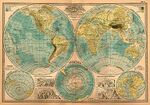Geography
Geography is a scholarly attempt to understand absolutely everything that happens on the Earth's surface. Geographers steal from geologists, geophyicists, economists, sociologists, anthropologists, philosophers, and physicists, with a special role for the chemist. The result is pointless spatial analyses. As a result, Geographers know a lot about many things, and fuck all about anything in detail.
When being taught as a school subject, geography is known as colouring in for morons. Thanks to this in England and Wales geography can only be taken as a B-TEC qualification in 6th Form.
The Sport of Moaners
Geography has two major subsections. The first one struggles frustratingly to be a 'science' (physical geography) and the second one struggles frustratingly to be a 'social science' (human geography).
Over the years, geography has expanded, puzzling most and scaring others. Geographers claim their "spatialness" can solve the ails of the world, and use this as justification for pointless expeditions to Wales to study grass, flowing water, and why that cloud looks like Mickey Mouse. Other research methods include counting sheep, sampling local beverages, dancing in salsa clubs, and extensively examining the roles of gophers in our society.
Geographers often start out life as Geologists but, upon realising that 'real' science is hard, defect to the dark side and become shriveled green imitations of their former selves, relying on 'spatialness' to help explain the wonders of the world.
Habitat
Geographers meet to have lengthy discussions about the locations of odd places, things, and phenomena--such as the tributaries to the river Wye in the UK, the hamlet of Why in Arizona, USA, or drawing maps from someone else's work.
It is also common to find geographers creating maps using data that geologists, chemists, physicists, biologists, and other scientists spent their life's work on, only to have a geographer "spatially compile" and call their own.
History
Geography began a long time ago. It was an attempt to quell the masses of fear for the unknown by creating elaborate stories of far away places. It then became all about exploring the areas of the Earth Europeans never thought existed, and then mapping and writing about them. But then everywhere got discovered, so it changed to explain why places were like what they were like. Initially this was all wildly unscientific, and not being able to fit into a mold of any "science", geographers got all statistical and mathematic in the 1950's . This bold move swelled many geographer's egos and they began to think they were actual scientists (even though they did not understand exactly what they were doing). Since then, Physical Geography has become so trenchantly scientific that serious discussions are currently taking place for a formal name change to Geographical Physics.
Human geography, however, realised its mistake and evolved to humanistic analysis, a.k.a. post-structuralism. It is called post-structuralism as it occurs after the structure of quantitative research, opting instead for qualitative. This shouldn't be mistaken for quality. The apparent gist is to try and see issues from the subject's viewpoint, copping off from anthropology and psychology again.
